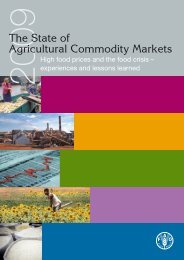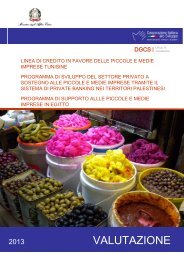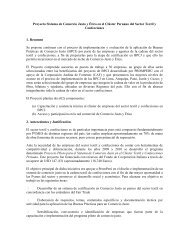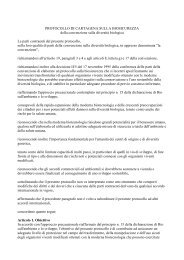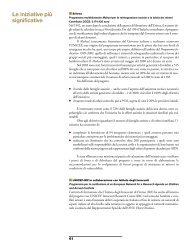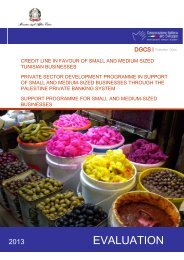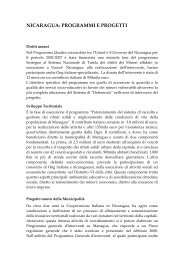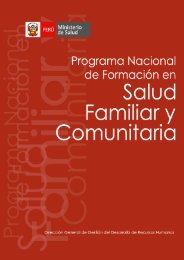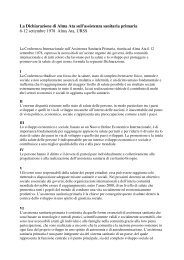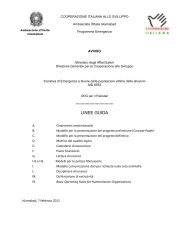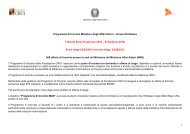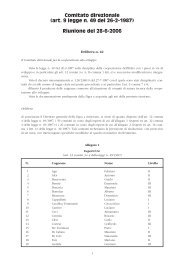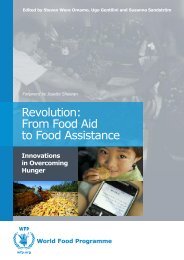C H A P T E R V I IC o n s i d e r a t i o n s i n s y n t h e s i s :s i t u a t i o n s , o p e n q u e s t i o n s , p r o p o s a l sa n d w o r k t r a c k s7.1 The situation in synthesisThe preceding chapters have analysed and described the multiple aspects of thephenomenon of the traffic and exploitation, some of these are meritorious, in ouropinion, of a profound reflection above all in function of the consequences that amore adequate focus and a correct interpretation can have on the implementation,or possible preventative action and contrast.Following, in a brief synthesis, are analytical points that the research has raised,a sort of guideline which presents in a synthetic form the principal elements of thesituation, as it is presented today. At the same time we will point out some stillunclear aspects, which only further knowledgeable effort can highlight.1. The areas of recruitment seem to have changed over time, in relation to thecontexts (from the urban areas to more suburban, rural areas), in relation to age(which has lowered, with sometimes the involvement of minors), and in relation tothe socio-cultural conditions of the victims (who in general are the most deprived,even if t<strong>here</strong> is no lack of sporadic cases of girls with a level of instruction andfrom a higher level family).The characteristics of the subjects “at risk”, or those more exposed to theflattery and pressure aimed at making victims of traffic and exploitation in themarket of prostitution, are at least in part, differentiated. It would seem that if, onthe one hand who undertakes the activity of recruitment aims - above all in recenttimes - at girls and young women totally under the thumbs of the wishes of thefamily (of the mothers in particular), easily fooled, fragile, faced with threats,unprepared enough to not question the power that derives from the magic-religiouspact sanctioned with a wodoo rite, on the other hand t<strong>here</strong> are also subjects moreaware, autonomous and determined.Also co-present t<strong>here</strong> appears, in all the women who migrate from Nigeria -even if in different proportions - the two typical profiles of “migratory projects”: onthe one hand the autonomous migratory projects of a family type, on the other,even if less, the autonomous migratory projects of an individual type.
As we know from the literature on migration, both profiles are characterised tobe projects which concern young migrants who depart on their own for Europeseeking to fulfil a dream of an economic redemption. In any case, in the first casethe project is shared, stimulated or even imposed on the boy or the girl (evenminor) or to the young migrant by the parents or family and has as an objective thesearch abroad of the means to consent the whole nucleus a more dignified life, ifnot its enrichment. In the second instead, it is an individual project, in the planningand in the undertaking, developed by the subject without the approval or with theindifference of the family.2. Usually in the migratory strategies, which involve minors or the youngestgenerations, the choice of the person to invest of the responsibility to leave doesnot fall on the most weak and unprepared of the family nucleus, but, on thecontrary, on those who present and demonstrate certain gifts. This is amplydemonstrated, in our case, by the girls that live the experience of prostitution inItaly. It appears evident - and the stories collected in this research amply bearwitness to this - that, in general, they present some tracts of personality such as thecapacity for relative autonomy (one thinks of the journey and the story of thosewho have been able to reach their goal having had very few indications on how toarrive t<strong>here</strong>), the determination and the force of character faced with thedifficulties, the resistance to suffering and fatigue, ambition and the desire tosucceed, etc.Naturally these are gifts more present in the young women who have activelysought to get out of the deprived conditions lived in Nigeria. But even thinkingabout the girls whose destiny is hetero-directed (by the family) and forced from thebeginning of the migratory event, the impression is that they bear determinedcharacteristics, the presence of which perhaps guides the research strategy andrecruitment by who, in Nigeria, undertakes this function. This would explain, atleast in part, the fact that, even being fully at the mercy of persons who exploitthem, once in Italy the girls are (and in part obviously become) capable of a relativeautonomy, sometimes of rebellion, often of a “strategic” adaptation to the changeswhich appear in the conditions of life and relations with the context, even capableof a good project idea concerning the future.Obviously these are impressions that only a deep investigation on the spot -placing the attention in a comparative form of the characteristics of the girlsrecruited with those of their same age not concerned by this research study - couldconfirm. An investigation would be most useful to define which girls are “at risk”of being approached and recruited.3. The family and/or individual needs, which represent the backgroundfavourable for the departure from the original context, are however very similar,even if differentiated in the intensity of the conditions of absolute deprivationand/or sentiments of relative deprivation 85 .85We are talking about “relative deprivation” to indicate the sentiment which is born from theconfrontation between what one has and what one thinks is interesting, beautiful, right, useful to have,
- Page 1:
TRAFFICKINGOF NIGERIAN GIRLSTO ITAL
- Page 5 and 6:
F O R E W O R D1. Objectives and st
- Page 7 and 8:
and who have identified the most si
- Page 9 and 10:
on the other hand, for those involv
- Page 11:
Case files analysed: Preventive det
- Page 15 and 16:
Table 2 - Socio-economic situation
- Page 17 and 18:
Table 3 - Nigerian citizens regular
- Page 19 and 20:
Table 5 - Social protection permiss
- Page 21 and 22:
Table 7 - Number of persons charged
- Page 23 and 24:
Table 8 - Detainee population sub-d
- Page 25 and 26:
and the United States enables this
- Page 27 and 28:
C H A P T E R IW a y s a n d p h a
- Page 29 and 30:
Figure No.2 - Edo State.It is not c
- Page 31 and 32:
Nigeria. From 1996 in Benin City an
- Page 33 and 34:
In this variegated framework, the d
- Page 36:
“Benin City is one of those State
- Page 39 and 40:
Various privileged witnesses of the
- Page 41 and 42:
In the first years of the traffic o
- Page 43 and 44:
pay considerable sums for lodging,
- Page 45 and 46:
The routesWe find at least three ty
- Page 47 and 48:
Figure No.5 - Trafficking routes th
- Page 49 and 50:
The journey overland through Africa
- Page 51 and 52:
new dispositions and contacts to co
- Page 53 and 54:
Then he sends her in a taxi to the
- Page 55 and 56:
T. remains in this house for 21 day
- Page 57 and 58:
detainees go towards the refectory,
- Page 59 and 60:
At this point the organisation esco
- Page 61 and 62:
was accepted by the Ivory Coast pol
- Page 63 and 64:
B.E. «Yes, I was given a Ghanaian
- Page 65 and 66:
Now the documents are “hired”:
- Page 67 and 68:
It is understood however that the v
- Page 69 and 70:
“There is no Nigerian passport wh
- Page 72 and 73: C H A P T E R I VL i v i n g a n d
- Page 74 and 75: have no shop and then there is no p
- Page 76 and 77: The cost to manage the house and th
- Page 78 and 79: mine since a long time, he can’t
- Page 80 and 81: A feminine managementIn analysing t
- Page 82 and 83: “There are many pimps that when y
- Page 84 and 85: The control of movementThe fact tha
- Page 86 and 87: Physical punishments can be made by
- Page 88 and 89: Control between psychological subje
- Page 90 and 91: arms), tortured in many different f
- Page 92 and 93: C H A P T E R VT h e o r g a n i s
- Page 94 and 95: Each penal procedure on the subject
- Page 96 and 97: Often it is the same madam who move
- Page 98 and 99: Even in numerous recent criminal pr
- Page 100 and 101: work arrangements (…) persons tha
- Page 102 and 103: man all the money she had in the ho
- Page 104 and 105: in the plates and everything and th
- Page 106 and 107: exploitation) has reached an amount
- Page 108 and 109: C H A P T E R V IT h e e n d o f t
- Page 110 and 111: A: «You have to bring me a present
- Page 112 and 113: Often the family is however not abl
- Page 114 and 115: the different evaluations of the as
- Page 116 and 117: The discussions on the possibility
- Page 118 and 119: eal results: to distance herself fr
- Page 120 and 121: of a different culture is very impo
- Page 124 and 125: In the case of the girls having mor
- Page 126 and 127: As has been many times noted, the c
- Page 128 and 129: under the profile of the “quality
- Page 130 and 131: person to obtain either relevant re
- Page 132 and 133: Numerous are the criminal juridical
- Page 134 and 135: If the accused claims to not knowin
- Page 136 and 137: sanctions, sometimes, also in prese
- Page 138 and 139: d) Investigative and judiciary co-o
- Page 140 and 141: The reform foresees, under Art. 1,
- Page 142 and 143: which the woman can definitively tu
- Page 144 and 145: witnesses, social operators - agree
- Page 146: and necessary, therefore, to think
- Page 149 and 150: in many cases they are driven to th
- Page 151 and 152: Melossi, D., (2002), “Le teorie s



